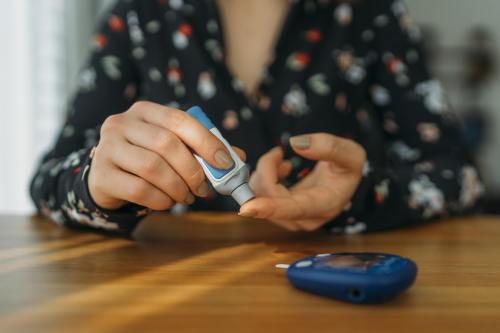Kidney-Friendly Foods to Correct Hypoglycemia

What is hypoglycemia?
The American Diabetes Association defines hypoglycemia as a low blood sugar (also called blood glucose) that requires action to bring it up to your goal range.1 Symptoms of hypoglycemia often happen suddenly and can include shakiness, sweating, weakness or fatigue, dizziness and blurred vision. You may also experience a fast heartbeat, headache, or feel anxious, irritable or confused.2
Usually, a blood sugar result of less than 70 mg/dL is considered hypoglycemia. However, some people may experience symptoms of hypoglycemia even if their blood sugar is above 70 mg/dL. Your diabetes care team can help you determine a blood sugar goal range that is right for you.
Common causes of hypoglycemia are not eating enough food or skipping a meal, taking too much insulin or diabetes medications, or being more physically active recently. Eating too little carbohydrate amounts or drinking alcohol can also lead to hypoglycemia. Illness or decreased kidney function can also cause hypoglycemia.
Kidney-Friendly Foods to Correct Hypoglycemia
Hypoglycemia can occur at any time, day or night. Eating at least 15 grams of carbohydrates (sugar) can help bring blood sugar back up. However, some carbohydrate foods may not be safe for people with kidney disease. For example, orange juice contains a high amount of potassium. Cola beverages contain large amounts of phosphate additives. Chocolate contains fat and takes longer for the body to digest, meaning it will take longer to increase your blood sugar. The following foods are all kidney-friendly and can help get your blood sugar back to goal range quickly.
Food Ideas
Beverages
1/2 cup juice (apple, cranberry, grape, pineapple)
1/2 cup regular (not diet) clear soda, such as ginger ale, Sprite®, or 7up®
Fruits
1 small apple
1/2 cup applesauce
2 tablespoons of raisins
15 grapes
Cereals/breads/crackers
3/4 cup of Kellogg’s Rice Krispies breakfast cereal
1 slice of white bread
7 saltine crackers
Candy
10 small candies (such as jelly beans)
3 hard candies or peppermints
5 Life Savers®
3 packets of Smarties®
13 SWEETARTS® pieces
4 Starburst® fruit chews
15 Skittles®
3 Swedish Fish®
5 DOTS® or other small gum drops
6 large jelly beans (or about 9-12 small jelly beans)
9-12 gummy bears
Others
1 tablespoon of honey
3 sugar packets
Glucose tablets/gel
1 tube or packet of glucose gel
3-4 glucose tablets
(These items can be purchased online or at your local pharmacy or grocery store. Always check the instructions for how to take them correctly.)
Tips
It’s a good idea to purchase one or more of these food options to have with you at all times in case of low blood sugar. Many of these foods have long shelf lives and don’t require refrigeration, meaning they won’t expire quickly and are easy to keep nearby at all times.
If your blood sugar is still low 15 minutes after eating one of these foods, eat another and check it again in 15 minutes. Once your blood sugar level is back up to goal, eat a full meal or snack containing carbohydrates, protein and fat. This will help keep your blood sugar from dropping too low again. If you experience low blood sugar often, contact your doctor, endocrinologist or CDCES (Certified Diabetes Care and Education Specialist). Your diabetes-related medication(s) may need to be adjusted. Also, reach out to your registered dietitian for help with your individual nutrition needs.
In some instances, blood sugar may remain be very low, despite efforts to raise it with nutrition or glucose supplements, and it is best to call 911 or seek immediate medical help from a doctor.
References:
Additional Kidney Diet Resources
Visit DaVita.com and explore these diet and nutrition resources:
DaVita Kidney-Friendly Recipes
This article is for informational purposes only and is not a substitute for medical advice or treatment. Consult your physician and dietitian regarding your specific diagnosis, treatment, diet and health questions.

Recent Comments